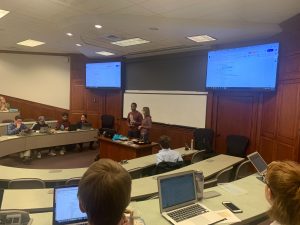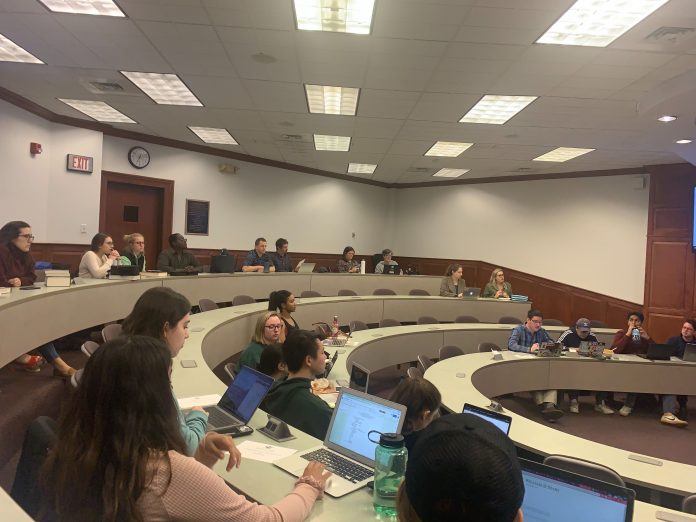At the meeting of the College of William and Mary’s 327th Student Assembly Feb. 18, SA Vice President Ellie Thomas evoked her constitutional privilege to break a tie vote during the introduction of an unfriendly amendment for the Publications Protection Act. Also at the meeting, which convened in the Marshall-Wythe School of Law as part of the ongoing Graduate Student Inclusion Month, senators discussed The Tribe Pride in ID Appearance Act, which proposes subsidizing fees for students who wish to change their Tribe Card photos to align with their gender identity.
While discussing the Tribe Pride in ID Appearance Act, senators debated whether the bill should include people who underwent significant physical changes in their appearance like weight loss or changes to appearances due to surgical needs. The discussion began when several committee chairs reported back that their committees had given negative recommendations of the bill, citing concerns about misuse of the funds and the issue of SA members gate-keeping these funds and consistently needing to make decisions about who can access them.
Sen. Zie Medrano ’20 worried that a few students, like the Secretary of Diversity and SA members, would have the exclusive responsibility of arbitrating which conditions qualify for receiving a subsidy for a new ID picture.
“It puts us in a place where we are liable to make calls that we have no business making,” Medrano said.
Undersecretary for Title IX Katie Grotewiel ’22 spoke in support of the bill, arguing that it was an important step towards inclusion at the College.
“If one student on this campus feels more represented by their student ID picture, then I think it’s worth it,” Grotewiel said.
Sen. Derek Kernus ’14 M.B.A. ’20 said that SA should not fund the cost of replacing student ID pictures, since it could create an unsustainable precedent.
“SA spends way too much money on things and just handing money out,” Kernus said. “And I understand people that are going through identity crises or physical appearance changes and they’re ashamed of their ID, but I believe that most people don’t know that they can pay $23 and get their ID changed and that that’s even an option to them, so they walk around with paper or scratch it out. I really think a more prudent way to go about doing this is to do a promotional campaign to make students aware that they can get their ID changed for $23, because it sounds like we’re just paying for them to get their ID changed without them knowing it. And I’m personally not okay with Student Assembly — essentially what we’re saying is the entire student body is going to be spending the money that we put in this fund to select a few students, regardless of whether or not we are monitoring that, they are just going to get new IDs.”
Kernus also cited concerns about whether it would be fair to all students to establish the fund, as some students could potentially be turned away from using it.
Grotewiel responded by illustrating the importance of an ID picture accurately representing students’ identities.
“The fact is, trans identities are much more than an identity crisis,” Grotewiel said. “That’s a reality that several students on this campus face, and they should be represented by their IDs. It’s not just they have the option to change it, it’s that they shouldn’t have to pay to change it. Does that make sense? … You shouldn’t have to pay for an identity that is out of your control. That’s just not dignified, frankly.”
Kernus then brought up the fact that a Tribe Card is considered a legal form of identification in Virginia.
“The argument here is that this is a legal ID, that’s the argument that was made last week,” Kernus said. “If a transgender person — I have no issues with transgender people, but using them as the reason this should be funded – if a transgender person goes to the state of Virginia to get their ID changed at the DMV, is the state of Virginia going to pay for them to get a new ID?”
Grotewiel responded by bringing the conversation about the bill back to its implications on campus.
“That’s kind of out of the scope of what we’re talking about,” Grotewiel said. “… The fact is that we’re paying for someone to have a picture on their ID that represents who they are. That’s it. That’s what this is for. It’s so that people can feel comfortable swiping into dining halls. It’s so people can feel comfortable swiping into their residence halls. It’s so people can feel comfortable being a student at William and Mary with an ID that says who they are. That’s what this is for. We are not talking about changing a driver’s license, this is a student ID.”
Sen. Kyle Vasquez ’21, the bill’s sponsor, spoke again about the origins of the bill and said that while the fund was originally purposed for transgender students, he did not want to constrict the funds. He also encouraged his fellow senators to think about the broader perspectives on the issue.
“Legislation in the US is mostly made up by racist homophobic white men, that’s just the reality we live in,” Vasquez said.
Senators ultimately voted to table the bill so that they could further hone its language and determine how access to the fund would be granted more specifically.
At the end of the meeting, Senate Chair Anthony Joseph ’21 urged SA members to be aware of the tone of their debate.
“We should just be cognizant of what we’re arguing about and what we’re not arguing about,” Joseph said. “If this were funding for the mental health center – which this has been determined as a mental health issue — we would’ve funded that and not asked questions. And I just think when we have these conversations, we need to have a little more respect about what we did in the past versus what we’re going to do now and not being hypocritical about some of the things we’re saying, because I think that would look unfavorably upon us moving forward, especially since again, I’d like to point out, the press is in the room. So let’s just be cognizant.”

Senators also voted on the Publications Protection Act, which codified Media Council funding for law school journals and all other for-credit publications to be allocated by a block grant through Media Council Reserve Funds. Sen. Will Wasson J.D. ’21 and Sen. Kat Ello J.D. ’21, who both work for law school journals, wrote the bill in concern that the lowered Media Council Reserve cap of $55,000 set by the Financial Regulatory Act and was passed by the 326th Senate, would negatively affect media publications that receive funding through the Media Council reserve fund.
Wasson and Ello also proposed that the cap of $55,000 be increased up to $65,000, a middle ground between the $75,000 currently set aside for Media Council reserves. Senators asked that the cap remain at $55,000 and the two Law School Senators accepted the request as a friendly amendment.
The bill also stated that contractual negotiations to set Media Council reserve caps should occur every three years instead of every two years. Joseph proposed an unfriendly amendment to keep the negotiations to every two years. The votes ended in a tie, which was broken by Thomas in favor of a three-year negotiation period.
Wasson asked for a friendly amendment to remove Media Council as a sponsor of the bill, as Media Council had originally voted in favor of the bill under the idea that the cap would potentially be set to $65,000.
Sen. Meghana Boojala ’22 led SA in a general discussion concerning finances, asking her fellow senators to consider the purpose of their funds as well as to evaluate the ways in which they have spent their funds so far this session. Boojala presented the most recent data about SA financing, which was from the 2018-2019 SA session.
During this time, SA spent 86 percent of its reserves, which fund SA’s bills on speakers and events. Senators also voiced concerns what they see as a problem of SA funding initiatives which should be funded by the College or by other student organizations.
Also at this week’s meeting:
- Student Bar Association President Nicholas Agyevi-Armah J.D. ’21 delivered a welcome speech to the senators and explained the purpose and organization of the SBA.

